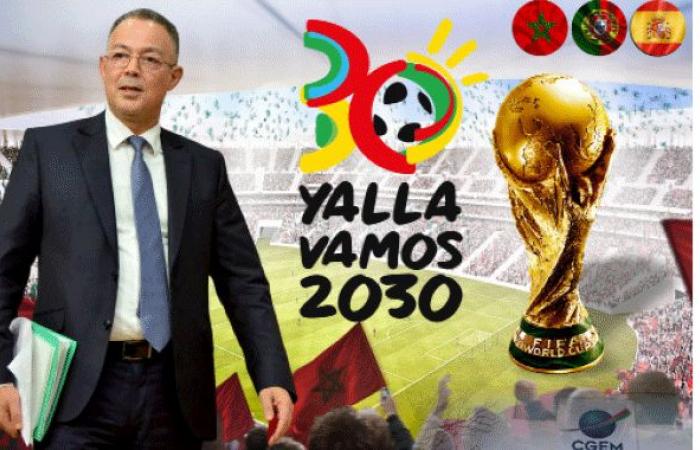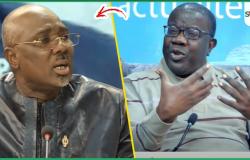The budget minister urges the private sector to seriously commit
Mobilisation
According to Fouzi Lekjaa, it is inconceivable that the 2030 World Cup is organized without the effective and significant presence of employers. A key place will thus be reserved for the private sector at all levels, and this from the start of the work until execution.
The private sector is invited to actively participate in the major sports site open at the national level. A frank call was launched Wednesday by Fouzi Lekjaa, Minister Delegate to the Minister of Economy and Finance responsible for the Budget, during a meeting with the members of the CGEM thus mobilizing employers in the process of organization of The 2030 World Cup. Originally focused on tax measures, this meeting was enriched by the pre -eminence of the debates around the World Cup.
In this regard, the Minister Delegate reviewed the issues linked to the organization of this great football meeting by identifying his economic benefits and the opportunities he will offer socio-economic. “Morocco will be, in the short term, a continental and global football platform. It is important to take advantage of this soft power, ”argues Mr. Lekjaa while emphasizing the close correlation between football and the business world.
Employers integrated in the organizing committee
A special place will be reserved for the CGEM in the organizing committee of this major event which will be validated in the coming days by the sovereign. “We will seriously integrate you into this major project by giving you visibility, explaining the issues and putting you in organizational constraints to succeed in the challenge,” said Lekjaa. And to specify: “It is inconceivable that we organize a World Cup without the effective and significant presence of the CGEM. Your place is essential at all levels, and this from the start of the work until execution ”.
Mr. Lekjaa has, in this sense, challenged the presidency of the CGEM to strengthen the capacities of companies in the various fields to raise this bet. “It would be a shame to see the many prizes and the expensive buildings allocated to foreign companies,” says the Minister Delegate reiterating the provision of his department to share with the private sector the specifications of the planned projects as well as the various aggregates of infrastructure planned by 2030.
A need for 40,000 volunteers identified for the World Cup
Beyond the investments that will be mobilized, Mr. Lekjaa estimates that the organization of the next sporting events, in this case the African Cup of Nations in 2025 and the World Cup in 2030, is a catalyst to go deep in the problem of training. Referring to the Minister Delegate, a need for 40,000 volunteers was identified for the organization of the 2030 World Cup. To fulfill this objective, a project is now underway with Mohammed VI Polytechnique University (UM6P) to design a project training dedicated to this major event.
A system which will also be finalized in consultation with private operators. “This is an opportunity to say that vocational training requires a global overhaul. With the cities of trades and skills, it is now necessary to introduce the quality aspect in the formation instead of seeking mass and the workforce, ”it is up to Fouzi Lekjaa.
-Multidimensional specifications in execution
If the World Cup in Qatar has generated net income of the order of $ 15 billion, the economic impact of that of 2030, jointly organized by Morocco, Spain and Portugal, will be even more important. A total of 48 teams will be in the running during this event against 32 teams that took part in the Qatar World Cup. In this regard, more than 10 million spectators are expected throughout the 7 weeks of the competition which will revolve around 104 games. To meet these challenges, Morocco has drawn up a multidimensional specifications encompassing all aspects of public policy (human rights, climate, economic transition, infrastructure, mobility, security, etc.).
Beyond the cities that will house the competition matches, 32 basic camps will be set up in all regions of Morocco. They will indeed require the upgrade of hotels and at least two training grounds. In terms of sports infrastructure, three segments have been defined. The first relates to the upgrading of the Rabat and Tangier stadium which will be completed in the next two months. To this is also added the start of the work of the Hassan II Benslimane stadium. “After the African Cup, we will work on the stadiums of Marrakech, Fez and Agadir, while continuing the work of the Hassan II stadium in Bensliman whose completion is scheduled in 2027,” said Lekjaa. The second segment concerns the modernization of railway infrastructure.
This site awarded by the ONCF relates to the operationalization of the Kenitra-Marrakech high-speed line in 2029. RER links will also be scheduled to connect Kénitra to Med V airport. Connections which, according to Fouzi Lekjaa, will generate a Urbanian metamorphosis of this territory. “This is a project that the sovereign has set as a priority of priorities and this since well before the signing of the strategic agreement with the United Arab Emirates,” recalls Mr. Lekjaa. And to specify that “funding is completed thanks to a significant contribution from the banking sector”.
As for the third segment, it concerns the extension of the airports of Marrakech, Tangier, Fez and Rabat as well as the construction of an air hub at Casablanca. “The logic of the hub is quite different from a departure /arrival airport.
This goes in line with the development of the RAM with which the government has signed a development contract which is in operation. The objective is to bring the RAM back to a size of 200 aircraft by 2037 to allow it to play the role of hub and serve Africa, “says Fouzi Lekjaa. Regarding the hotel capacity, the Minister Delegate was delighted with the sustained dynamics of the sector as well as the notorious development of the hotel capacity in the various destinations of the Kingdom, in particular in Fez, Tangier and Rabat.
Exchange reform for economic operators: the reflection undertaken
Measures
Reflection around a foreign exchange reform is currently initiated. Fouzi Lekjaa indicates that this approach will soften exchange operations for economic operators. “It is absurd today that an economic operator who pays for his taxes imposed on him for restrictions on the use of ordinary law,” he said. Regarding the tax amnesty, the Minister indicated that this operation promotes reintegration into the formal fabric and the revival of investment on the part of taxpayers. Mr. Lekjaa, in this sense, highlighted the enthusiasm that the last days of this operation which aimed to encourage taxpayers to voluntarily regularly regularize their taxable profits, not having been declared before January 1 2024, by paying a liberating contribution fixed at 5 % of the value of declared assets and expenses. Mr. Lekjaa also reported a reflection carried out with Bank Al-Maghrib to achieve structural solutions to the cash. To this end, he assured that it is a logic focused on the opening of legalization parentheses and allowing both to reintegrate the formal tissue and to invest.






